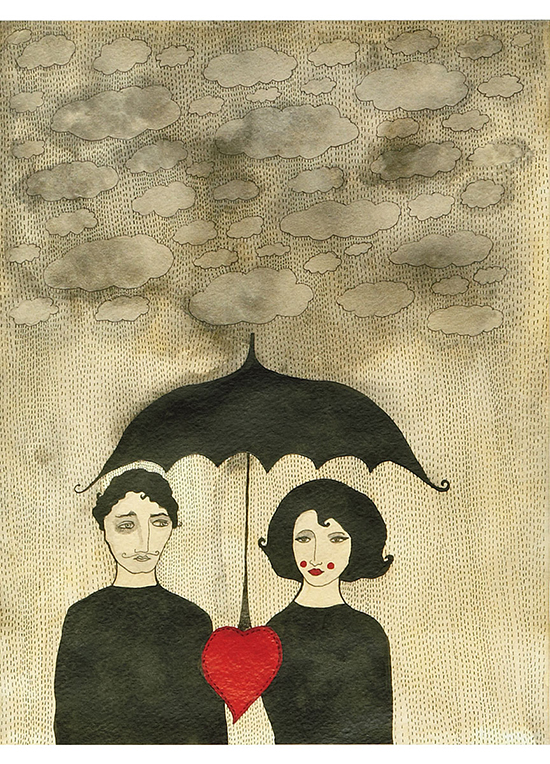Wait—you don’t think that’s uncommon knowledge? How about the fact that scientists have determined that men have difficulty understanding women on a neurological level, because that is how their brains are hardwired? Researchers in Germany had men look at photographs of people’s eyes and attempt to identify the emotions being expressed. When the eyes in the image were those of a woman, the men took longer to answer and were less accurate in their assessments. When men’s brains were scanned during this process, it was found that the part that generates empathy was much more active when viewing the emotions of other men than of women. It appears that men perhaps evolved to be skilled at evaluating the intentions of their rivals, rather than brokering peace at home.
 It has been scientifically proven that beards are awesome. For one thing, a beard can literally save you from cancer, by blocking 90% of the UV rays that would ordinarily be hitting your face. Since UV radiation also causes signs of aging in skin, a beard can keep you looking younger longer. Facial hair can also reduce your trouble with allergies, by trapping dust and pollen. On the other hand, shaving can cause skin irritation, ingrown hair and bacterial infections. So don’t just grow that beard to enhance your rugged manliness. Grow it for your health.
It has been scientifically proven that beards are awesome. For one thing, a beard can literally save you from cancer, by blocking 90% of the UV rays that would ordinarily be hitting your face. Since UV radiation also causes signs of aging in skin, a beard can keep you looking younger longer. Facial hair can also reduce your trouble with allergies, by trapping dust and pollen. On the other hand, shaving can cause skin irritation, ingrown hair and bacterial infections. So don’t just grow that beard to enhance your rugged manliness. Grow it for your health.
 You may not have heard of zymology, but you have most certainly seen the results of its research. Zymology is the study of how sugar, yeast and water transform into alcohol. While that may sound like something that college fraternities have been researching informally for years, it is actually a real and rigorous branch of science. The first zymologist was Louis Pasteur, inventor of the vaccine. It was he who discovered the link between yeast and fermentation. Eduard Buchner, the 1907 Nobel Prize winner in chemistry, was also a zymologist, who further illuminated the biological processes of fermentation. In fact, the search for a better understanding of beer laid the foundation for what later became known as molecular biology.
You may not have heard of zymology, but you have most certainly seen the results of its research. Zymology is the study of how sugar, yeast and water transform into alcohol. While that may sound like something that college fraternities have been researching informally for years, it is actually a real and rigorous branch of science. The first zymologist was Louis Pasteur, inventor of the vaccine. It was he who discovered the link between yeast and fermentation. Eduard Buchner, the 1907 Nobel Prize winner in chemistry, was also a zymologist, who further illuminated the biological processes of fermentation. In fact, the search for a better understanding of beer laid the foundation for what later became known as molecular biology.
 Depends on how you define colorful. If you mean “can see the greatest variety of color,” then the winner would have to be the peacock mantis shrimp. All of the colors a human eye can see come from just three kinds of color-receptive cells in the back of our eyes. The peacock mantis shrimp, in comparison, has sixteen kinds of color receptors, enabling it to see colors we can’t even imagine. If you mean “what animal displays the most color,” the answer again might be the peacock mantis shrimp, which shimmers with a rainbow of neon hues. But if you mean “colorful,” is in having interesting adventures—again, it’s the shrimp. Its fabulous fashion sense is only a cover for some ninja-worthy predatory skills. It attacks its prey with club-like appendages that it can move at the speed of a .22 caliber bullet, creating an underwater shockwave so powerful that it causes bubbles to emit tiny bursts of light. Brilliant.
Depends on how you define colorful. If you mean “can see the greatest variety of color,” then the winner would have to be the peacock mantis shrimp. All of the colors a human eye can see come from just three kinds of color-receptive cells in the back of our eyes. The peacock mantis shrimp, in comparison, has sixteen kinds of color receptors, enabling it to see colors we can’t even imagine. If you mean “what animal displays the most color,” the answer again might be the peacock mantis shrimp, which shimmers with a rainbow of neon hues. But if you mean “colorful,” is in having interesting adventures—again, it’s the shrimp. Its fabulous fashion sense is only a cover for some ninja-worthy predatory skills. It attacks its prey with club-like appendages that it can move at the speed of a .22 caliber bullet, creating an underwater shockwave so powerful that it causes bubbles to emit tiny bursts of light. Brilliant.
 The horseshoe is one of the best-known lucky charms and has been for ages. In medieval times, a trio of horseshoes would be nailed to a sick person’s bed to please God, Wod, and Loki. In Norse mythology, Wod is the god of wisdom and Loki is the god of mischief. All three had to be appeased to promote balance in the spirit world. Interestingly, Loki also inspired the expression “one for luck.”
The horseshoe is one of the best-known lucky charms and has been for ages. In medieval times, a trio of horseshoes would be nailed to a sick person’s bed to please God, Wod, and Loki. In Norse mythology, Wod is the god of wisdom and Loki is the god of mischief. All three had to be appeased to promote balance in the spirit world. Interestingly, Loki also inspired the expression “one for luck.”
Uncommon Knowledge: What does it really mean to “fly by the seat of your pants”?
May 25, 2013 Those hilarious videos you’ve seen online, where hapless newlyweds accidentally topple their towering wedding cakes, are actually right in line with a centuries-old tradition. Before wedding cakes as we know them were developed, a tradition in medieval England was to celebrate a marriage with a towering pile of sweetened buns. The bread was heaped high on the table, and if the couple could reach across for a kiss without knocking any over, they were said to be guaranteed a life of happiness together. It seems likely that the guests would leave the stack just short enough for the bride and groom to succeed—and yet, the entertainment value of seeing it fall must have been a sore temptation. So, perhaps all of these collapsing confections in the videos are not accidents, but exactly what the wedding cake was originally designed to do.
Those hilarious videos you’ve seen online, where hapless newlyweds accidentally topple their towering wedding cakes, are actually right in line with a centuries-old tradition. Before wedding cakes as we know them were developed, a tradition in medieval England was to celebrate a marriage with a towering pile of sweetened buns. The bread was heaped high on the table, and if the couple could reach across for a kiss without knocking any over, they were said to be guaranteed a life of happiness together. It seems likely that the guests would leave the stack just short enough for the bride and groom to succeed—and yet, the entertainment value of seeing it fall must have been a sore temptation. So, perhaps all of these collapsing confections in the videos are not accidents, but exactly what the wedding cake was originally designed to do.
For more great wedding tips and advice, visit Wedding Week on our blog!



